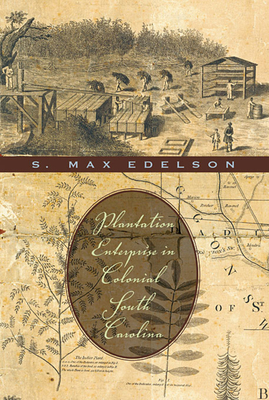

 Harvard University Press
Harvard University Press
Plantation Enterprise in Colonial South Carolina


Key Metrics
- S Max Edelson
- Harvard University Press
- Paperback
- 9780674060227
- 9.26 X 6.19 X 0.94 inches
- 0.98 pounds
- History > United States - State & Local - South (AL,AR,FL,GA,KY,LA,MS,NC,SC,TN,VA,WV)
- English
 Secure Transaction
Secure TransactionBook Description
This impressive scholarly debut deftly reinterprets one of America's oldest symbols--the southern slave plantation. S. Max Edelson examines the relationships between planters, slaves, and the natural world they colonized to create the Carolina Lowcountry.
European settlers came to South Carolina in 1670 determined to possess an abundant wilderness. Over the course of a century, they settled highly adaptive rice and indigo plantations across a vast coastal plain. Forcing slaves to turn swampy wastelands into productive fields and to channel surging waters into elaborate irrigation systems, planters initiated a stunning economic transformation.
The result, Edelson reveals, was two interdependent plantation worlds. A rough rice frontier became a place of unremitting field labor. With the profits, planters made Charleston and its hinterland into a refined, diversified place to live. From urban townhouses and rural retreats, they ran multiple-plantation enterprises, looking to England for affirmation as agriculturists, gentlemen, and stakeholders in Britain's American empire. Offering a new vision of the Old South that was far from static, Edelson reveals the plantations of early South Carolina to have been dynamic instruments behind an expansive process of colonization.
With a bold interdisciplinary approach, Plantation Enterprise reconstructs the environmental, economic, and cultural changes that made the Carolina Lowcountry one of the most prosperous and repressive regions in the Atlantic world.
Author Bio
S. Max Edelson studies the history of British America and the Atlantic world. His research examines space, place, and culture in colonial North America and the Caribbean. His first book, Plantation Enterprise in Colonial South Carolina (Harvard, 2006) examines the relationship between planters and environment in South Carolina as the key to understanding this repressive, prosperous society and its distinctive economic culture.
It shows that although plantations often represent stasis in myths of the Old South, they were in fact dynamic instruments of empire. Plantation Enterprise was awarded the George C. Rogers Prize by the South Carolina Historical Society and the Theodore Saloutos Memorial Award by the Agricultural History Society. Harvard University Press published a paperback edition of the book in 2011.
His second book, The New Map of Empire: How Britain Imagined America Before Independence (Harvard, 2017), describes how Britain used maps and geographic knowledge to reform its American empire in the eighteenth century. The book follows the surveyors who fanned out across frontier territories--from the frigid coasts of the Gulf of St. Lawrence to tropical islands in the southeastern Caribbean--to make distant spaces legible from London. The schemes of colonial development and control that these maps envsioned, Edelson argues, helped provoke the reisstance that led to the American Revolution. The New Map of Empire features a free companion website with a dynamic digital archive of more than 257 maps and charts discussed in the book. It was a finalist for the George Washington Book Prize in 2017 and received the John Lyman Book Award for U.S. Maritime History by the North American Society for Oceanic History.
Edelson and Research Professor Bill Ferster were awarded a National Endowment for the Humanities Digital Implementation Grant in 2012 to develop MapScholar at UVa's SHANTI (Sciences, Humanities, and Arts Network of Technological Initiatives). MapScholar is a dynamic visualization tool for historic map collections. It offers a free, open-source portal that gives scholars the ability to bring together high-resolution map images from a variety of sources, analyze them in rich geospatial contexts, and use them to illustrate new interpretations in the history of cartography. Edelson received an American Council of Learned Societies Digital Innovation Fellowship in 2010 to begin this digital humanities research.
Edelson and Professors Christa Dierksheide and Alan Taylor direct the UVa Early American Seminar at Monticello, an ongoing research seminar jointly sponsored by the Corcoran Department of History and the International Center for Jefferson Studies. The intellectual center of our dynamic graduate program in colonial, Revolutionary, and early national history, the EAS is a community of scholars that includes PhD students, faculty, and visiting researchers who meet regularly to share and critique works in progress.
Source: UVA Arts & Sciences
Videos
No Videos
Community reviews
Write a ReviewNo Community reviews